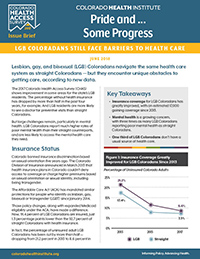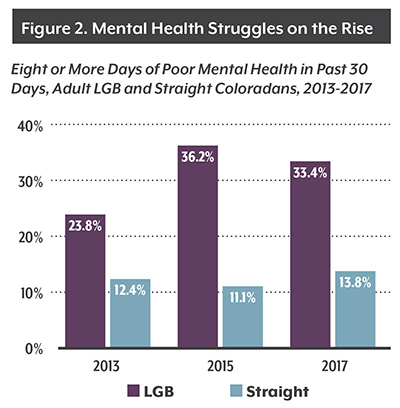Denver Health Takes Steps to Build Trust Between LGBT Patients and Providers
Lesbian, gay, and bisexual (LGB) patients and their providers don’t seem to be on the same page in Colorado.

In June — Pride Month — CHI reported on the current state of LGB health access and care in Colorado. The report had several encouraging findings: Policy changes have led to more LGB Coloradans having health insurance, for instance. But it also pointed out a discrepancy between provider perceptions and LGB patient perceptions of the care being provided.
More than three quarters of Colorado providers think it is important to know the sexual orientation of their patients, according to a 2013 project by the advocacy group One Colorado. And nearly 98 percent of physicians said they are comfortable treating lesbian, gay, bisexual and transgender (LGBT) patients. But the latest CHAS data show that 20 percent of LGB Coloradans* feel they were treated or judged unfairly by someone working in the health care system.
What’s behind this discrepancy? CHI went to Denver Health to speak with Kari Kuka, director of its nationally recognized LGBT Center of Excellence. We wanted to find out what Colorado is and should be doing to improve provider-patient communication, increase LGBT patient awareness and satisfaction, and create a seamless system of responsive and responsible health care for all Coloradans.
How is Denver Health working to meet the health care needs of all Coloradans and especially of LGBT patients?
Instead of funneling LGBT patients to one clinic specializing in LGBT health, Denver Health has trained providers who are identified as LGBT-friendly throughout the Denver-Metro area. The idea is that every person should have access to trusted primary care providers at their nearest clinic.
Kuka hopes that, through this model, LGBT Coloradans will access and receive care when and where they need it instead of having to travel to a specific clinic. Ideally, this will reduce LGBT ER-visits. (LGB Coloradans are currently more likely to visit the emergency room, according to CHI’s recent report).
It starts with staff:
Denver Health provides mandatory LGBT health education training for all staff in each of its clinics. As part of training, staff members learn how to ask about patients’ sexual and gender identification, how to affirm and support patients, and how to ensure that every patient is getting the best possible care.
When CHI met with Kuka this summer, more than 50 providers at Denver-area clinics had gone through further training in LGBT health and pre-exposure prophylaxis (PrEP) services (PrEP is a prophylactic drug that can lower a person’s chances of getting infected with HIV). And Denver Health is training new doctors all the time. Kuka also advocates for expanding cross-sex hormone therapy, telling CHI that providers don’t need to be specialized to administer hormones to their patients. “If you can manage diabetes, you can manage hormones.”
As a training hospital, Denver Health houses medical residents year-round. All residents at Denver Health are trained in LGBT care and surgery just as they are in any other specialization.
Denver Health also hired two LGBT patient navigators who staff the Center of Excellence telephone line, guide patients through the health care system, and more. A patient navigator can increase patients’ health care literacy and understanding of the system, accommodate for trauma, or meet a patient in the emergency department to guide them and advocate their interests. (Read CHI's recent report on health navigators.)
Denver Health's navigators are themselves a part of the LGBTQ community and, like Kuka, are passionate about meeting the needs of their patients. Already, the two patient navigators have brought in over 550 new patients. And 80 percent of these new patients identify as transgender or gender nonbinary. Denver Health is tracking its patient intake and collecting data to support the effectiveness of the patient navigator model and to inform the development and improvement of its Center of Excellence.
Denver Health's expanding services – but there’s still a long way to go.
 Kuka plans to expand Denver Health’s Center of Excellence to incorporate the full spectrum of LGBT care and, one day, to serve as a model and an ally for health centers throughout Colorado.
Kuka plans to expand Denver Health’s Center of Excellence to incorporate the full spectrum of LGBT care and, one day, to serve as a model and an ally for health centers throughout Colorado.
Within the next year and a half, Denver Health will integrate more services, ranging from hair removal to voice therapy. Two to three years out, Kuka hopes to provide fertility care, including family-building and fertility preservation, for LGBT Coloradans.
And Denver Health’s hospital and health centers already do not discriminate between their patients’ visitors based on anything other than a list of patient-identified names. (Some hospitals permit only certain family members to visit, and those rules can exclude same-sex partners.)
For many Coloradans, changes like these can’t come soon enough. One Colorado’s 2016 Needs Assessment found that lesbian, gay, bisexual, transgender, and queer (LGBTQ) Coloradans are experiencing more harassment and discrimination, including on the street, at work or school, at public establishments, at home, and at places of worship, than they were in 2010.
More LGB Coloradans have been reporting mental health issues in recent years, according to the CHAS. And more than half of One Colorado’s respondents believe access to affirming sexual health services is one of the greatest needs facing the LGBTQ community in 2016. A sense of fear and lack of knowledge of the health care system are common in the LGBT community, says Kuka.
Kuka said it's important to keeping people with pre-existing conditions safe from insurance hikes and to expand Medicaid benefits to meet LGBT health care needs. Kuka also hopes to see movement making it easier for patients to change their name and/or sex on key identifying information.
In the meantime, efforts like Denver Health’s are a step toward making sure that all Coloradans have access to the care they need and that they don't feel treated or judged unfairly while they’re getting it.
* The Colorado Health Access Survey (CHAS), the main data source for CHI’s recent brief, asks respondents if they are lesbian, gay, or bisexual, but not if they are transgender. One Colorado’s research did include transgender Coloradans. One Colorado is currently conducting a more in-depth survey on health among the state’s lesbian, gay, bisexual, transgender and queer (LGBTQ) residents.
Want more information about health and health policy in Colorado? Subscribe to our newsletter or find CHI on Facebook and Twitter
Related Blogs and Research
